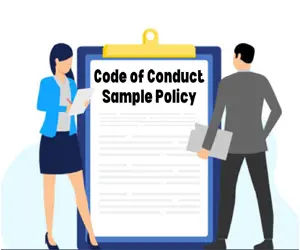A code of conduct is a set of rules and principles that defines the behaviour and ethical standards within an organization, profession or community. The code of conduct addresses various aspects including ethical considerations, professional conduct, compliance with laws, and helps in achieving positive workplace environment.
The code of conduct policy designed below considers the following points:
-
The company code of conduct make employee aware of the organisational values.
-
It also emphasizes on the fact that company’s ways of working is based on the employee Professional code of conduct.
-
This corporate code of conduct considers model code of conduct.
-
The code of conduct for employees emphasize on good common sense.
-
The code of conduct examples provides the instances which are regarded as misconduct.
-
The code of conduct and professional conduct serves as reference for employee to go for better decision making.
-
The company code of conduct increases the Integrity value of the company.
-
The code of conduct in workplace avoids potential problems and to address problems when they arise.
-
The code of conduct policy at work promotes open door policy.
-
The code of conduct definition brings responsible business citizenship.
Table of content
Code of Conduct Policy at work
The Code of conduct policy emphasize on the behaviour of the employee as per the Professional code of conduct. It also lays down the expectation towards employees, colleagues and organisation as a whole. It explains in details respectability of the employees regarding self and colleagues, conflict of interest, privacy of information, safety and security of company’s assets, prevention from any kind of harassment. It is expected from all the employees of the organisation to follow code of conduct policy in order to avoid any kind of disruption.
Code of Conduct Meaning
The code of conduct meaning as per the Wikipedia is “A company code of conduct is a set of rules which is commonly written for employees of a company, which protects the business and informs the employees of the company's expectations. It is appropriate for even the smallest of companies to create a document containing important information on expectations for employees”.
Code of Conduct Definition
The code of conduct meaning as per the Wikipedia is “A company code of conduct is a set of rules which is commonly written for employees of a company, which protects the business and informs the employees of the company's expectations. It is appropriate for even the smallest of companies to create a document containing important information on expectations for employees”.
A code of conduct is a set of rules outlining the proper conduct, ethical standards, and principles for individuals within an organization. The code of conduct policy outlines the norms that individuals are expected to follow in their professional and personal conduct. It also addresses issues like conflict of interest, confidentiality, and the responsible use of resources.
Disclaimer: The content prepared has been created with greatest care. These policies have been prepared for sample. However for accuracy and completeness hrhelpboard.com cannot guarantee. The user is therefore requested to professionally check or to have professionally checked the suitability of all content for its use.
Code of Conduct Sample Policy |
 |
Objective:The objective of code of conduct policy is to make sure that company code of conduct is followed in all its business. The organisation is meant to form a positive work environment which is free from any kind of discrimination. It is also meant to make employees aware of corporate code of conduct which is expected from all employees of the company.
Purpose: The purpose of this policy is to lay down rules and regulations regarding code of conduct and professional conduct to maintain the trust of employees in the organisation they are working for and to increase transparency which in turn help bring good name to the company. Code of conduct helps in fostering a positive and respectful work environment, ensuring integrity, transparency, and compliance with legal standards. By setting clear expectations, the Code of Conduct promotes ethical decision-making, helps prevent misconduct, and builds trust among employees.
Eligibility:
This Policy applies to all the regular employees of the company.
What is code of conduct?
A code of conduct document explains about the mission and values of an organisation. It also tells about the kind of problems faced by employee’s related to ethical issues.
Clauses Covered under the Policy
Conflict of Interest: The employees are supposed to work at all times in company’s interest. There should not be any conflict where in an employee’s personal or professional interest interferes with the interest of the company. Employees are expected not to involve themselves in any other business or activity which may affect their working in the company. As per the code of conduct example all employees should have a sense of faithfulness towards the organization they are working for. Therefore, they must avoid any kind of situation which is contradictory for the interest of the company. There should not be any conflict of interest with the company. This is as per the model code of conduct.
A situation of conflict arises when an employee’s personal interest interferes with the company’s interest. Conflict of interest may also occur when an employee misuse his powers to receive improper personal benefits.
Conflict of interest may also occur when an employee is involved in double employment or accepting gifts of high cost for personal gains which will create a situation of conflict of interest.
Respectability: It means the employee is following the code of conduct in the workplace. It includes their obedience towards the personal behaviour which is expected from an employee in their work and interpersonal skills.
Privacy: As per professional code of conduct an employee is supposed to keep the confidential information private. Due to employee’s job role in the company they may come across some confidential information which is meant not to be shared with anyone inside or outside the company. Such information can be shared only when permitted by the senior management to do so. Any leakage of such information can be beneficiary to the competitor and it can be harmful to the company.
Privacy of financial Particulars: As per the company code of conduct a company is supposed to disclose the company’s financial as per the accounting principles rules and regulations. All records of the company must clearly reflect the company’s transactions.
Cheating: Any kind of cheating as per the code of conduct definition is not allowed within the organisation. Following will be considered as an act of cheating:
-
Claiming reimbursement on false expense report
-
Using company assets for personal gains
-
Illegal transactions
-
Double employment
-
Sharing wrong data in company records for accounting purpose
-
Sharing of confidential information
-
Unfair dealings
-
Non compliance with company’s rules and regulations
-
Documents forgery
-
None reporting of illegal or unethical behaviour.
Safety and security of company’s property: As per the code of conduct of employees they are required to maintain company’s property with utmost care. Employees are responsible for keeping safe the company’s property from any misuse, theft or any other act that result in the loss of property. The clause is also applicable in case of inventions and patents. It is also not allowed to dispose of any company property for personal gains.
Involvement in another business or employment: According to corporate code of conduct an employee is supposed not to be engaged or interested in any other business or employment. All employees are supposed to devote their time and efforts to promote the company’s business they are working for.
Harassment: Any kind of harassment on account of age, sex, religion, race, caste, physical disability, marital status, gender is strictly prohibited. Employees are responsible to take all necessary actions and steps in term of support or preventive actions. This is as per the code of conduct at work.
Documents withholding: All the documents related to senior management must be taken care of as per the documents policy. Documents should not be destroyed as they might be used for any future cause. Any document which is to be destroyed must be approved by senior management. This is according to the code of conduct in workplace.
Alcohol or illegal substance use: All the employees should be informed that use of alcohol or any other drugs etc is strictly prohibited.
Presents and Other profit: As per the code of conduct at work an employee must not accept or give any presents or gifts which might affect company’s business decision. Any exchange of gifts with customers, suppliers is strictly prohibited. Any kind of direct or indirect bribe or inducements are not allowed. Any such acceptance will be the violation of code of conduct.
Abiding to the law, rules and regulations: No inside trading of any kind is allowed within the company. Each employee of the company must abide to the rules and regulations of the organisation. No trading is allowed in the company’s securities.
Reporting of unethical or illegal behaviour: All unethical or illegal behaviour must be reported to supervisor or senior management. In case employee is uncomfortable sharing it with supervisor or senior management an employee should approach the audit committee.
Job responsibility and control: As per the code of conduct at work employees must do their job with integrity and honesty. Supervisors and managers must have proper control over the power assigned to them. In no case they are allowed to misuse it on their subordinates. Both managers and their subordinates should work in collaboration.
No Retaliation: According to the code of conduct policy there must not be retaliation against the employee who raises voice against any wrongdoing within the company. Any such act will be the violation of code of conduct. Raising a concern cannot be the basis of adverse employment.
Compete Fairly: As per code of conduct policy there should not be any deception or abuse of confidential information to have an edge over the competitor.
Career Opportunity: A Code of Conduct enhances career opportunities by setting ethical standards, promoting professional behaviour, and creating a positive work culture.
Right dealing: According to code of conduct all employees should deal rightly with the customers, supplier’s internal and external customers. No one is allowed to take advantage of one’s position and to deal wrongly by misrepresentation.
Attendance reporting: According to the code of conduct for employees attendance must be marked regularly. However in case an employee’s absence due to personal reasons, supervisor must be contacted.
Social Media: As per company code of conduct no content related to company should be posted on any site without approval from the senior management. Information regarding company’s colleagues, vendors, suppliers should not be made public on social media. Also use of logo, trademark is strictly prohibited.
Job responsibility and control: As per the code of conduct at work employees must do their job with integrity and honesty. Supervisors and managers must have proper control over the power assigned to them. In no case they are allowed to misuse it on their subordinates. Both managers and their subordinates should work in collaboration.
Anti bribery and money laundering: As per the company code of conduct no employee is allowed to bribe anyone inside or outside the company. No bribe is allowed to be offered to any official for business reasons and for sake of unfair advantages. Money laundering is strictly prohibited within the organisation.
Data Privacy: Data collected from employees for internal purpose of the company such data should be kept private. However if such data is to shared with an outside company, consent must be taken from senior management before sharing.
Environment & Sustainability: Our code of conduct policy gives equal importance to environment protection and sustainability. We as a company give our best to preserve the environment. Regular education is given to employees regarding environment conservation.
Failure to comply with code of conduct: Any failure to comply with code of conduct must be dealt with strict punishment which might include loss of service or termination.
Revision of the policy: The Company reserves the right to revise, modify any or all clauses of this policy depending upon demand of business.
Explanation of the policy: Corporate HR department will be the sole authority to interpret the content of this policy.














